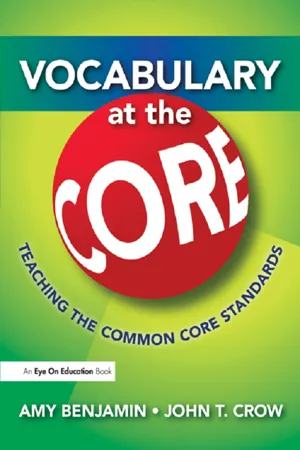![]()
Vocabulary at the Core
There is a lot that we don’t know about the inner workings of the brain, but one thing is certain: vocabulary forms the core of its conscious operation.
Gateways
Our brains are phenomenal machines—complex, interactive, and powerful, capable of feats that computer scientists can only dream of at the moment. Our brains are constantly bombarded by input from our senses, and from this information we form memories. Some are soon forgotten; others are stored in long-term memory, a process that, incidentally, occurs while we are asleep. However, memories are not stored as self-contained packets. Instead, as Sousa (2001, p. 50) notes, “Different parts of a memory are stored in various sites which reassemble when the memory is recalled.” While recall can certainly be triggered by a smell, an image, a taste, etc., the primary key to recalling stored data is vocabulary. Hearing or reading a word or phrase allows you to access an incredible amount of information that you have stored about the targeted phenomenon.
To illustrate, think for a minute about kitchen. Just from seeing this word, you are able to easily recount the following:
♦ What a typical one contains
♦ What yours looks like: the location of the appliances, the placement and color of the cabinets, the floor covering, etc.
♦ The last thing that was prepared in it
♦ Where cups, dishes, silverware, etc. are stored in it
♦ What your kitchen smells like when your favorite dish is being prepared
♦ The dangers inherent in a kitchen
♦ What your parents’ kitchen looked like
♦ Good or bad things that have happened to you in a kitchen
This list could go on and on. Again, what serves as a gateway, as an entry point to this amazingly large body of knowledge? The single word kitchen. And, of course, this is just one of tens of thousands of concepts that you have stored, each of which interconnects into a vast collection of information that is scattered throughout your brain.
Robert Marzano, author of Building Background Knowledge for Academic Achievement (2004), defines a word as “…the label associated with a packet of knowledge stored in permanent memory” (p. 32). These packets of knowledge are what he refers to as background knowledge. Richard Anderson called each collection of knowledge a schema (plural schemata). Every English-speaking person has a kitchen schema, for example. Every person’s kitchen schema certainly will not contain the same details: there will be cultural differences, experiential differences, socioeconomic differences, and so forth. But the mere mention of the word kitchen allows each person to access his or her kitchen schema instantly. Words trigger schemata, opening doors to all kinds of stored knowledge.
Now imagine what it would be like if we humans had not developed language. We could still have the same brains, brains that were capable of learning from experience. So we could still store all of the same information about kitchen, but we would have no easy way to access this information. Without the organizing principle of vocabulary, all of the facts and experiences that we accumulated across time concerning kitchen would be randomly scattered across our brains as they occurred and, as a result, be rendered almost inaccessible. Obviously, the ability to communicate is certainly a very powerful advantage that language provides us humans. However, the ability to organize and access stored information is, perhaps, equally as important as the ability to communicate this information. And, again, central to this organization and access is vocabulary.
All of your students know what a kitchen is. They know the word kitchen not only because they’ve heard it countless times, but also because of their experiences. And they’ve had reason to use the word kitchen. Now think about a word that might appear on one of your vocabulary lists, or in a poem, or a novel, or a historical document, or a newspaper editorial—a word that your students would not know. When they hear or read such a word, nothing is triggered: no images, no familiar experiences, no cavalcade of other words associated with it. Without the ability to access the background knowledge that might be associated with this word, your students’ ability to interact with the content and to interrelate it with existing information—without this gateway to previous experiences, comprehension begins to grind to a halt. If too many gateways are blocked, comprehension stops completely.
For example, what if someone came up to you and asked, “How are transposons remethylated during epigenetic reprogramming?” If you share a background similar to ours, namely, a very limited exposure to microbiology, this question would not provide a gateway to a single schema, to the slightest bit of background knowledge. Vocabulary is at the core of our ability to communicate or to absorb new knowledge.
Vocabulary and Education
Research shows over and over that vocabulary skills correlate very highly with academic ability:
♦ Intelligence: Anderson and Freebody note that “the strong relationship between vocabulary and general intelligence is one of the most robust findings in the history of intelligence testing” (quoted in Marzano, 2004, p. 32). Vocabulary scores correlate more highly with intelligence levels than any other individual measure. That’s why standardized tests such as the SAT, ACT, and GRE have a vocabulary component.
♦ Reading: Farley and Elmore studied college students enrolled in remedial reading. They found that vocabulary was the only statistically significant predictor of various reading skills. According to Fisher and Frey (2008), research confirms that “…students with smaller vocabularies and lower comprehension levels read with more trepidation, question the text less, and fail to notice when they don’t understand something” (p. 4).
♦ Predictor of Academic Success: Reading comprehension has been repeatedly shown to be a good predictor of academic success at the high school and college levels. So the chain is complete: vocabulary is an excellent predictor of reading ability, and reading ability is an excellent predictor of academic success. Vocabulary truly is at the core—not only of the ELA classroom, but in all of the content areas.
Definitions Are Not Enough
Research has consistently shown that definitional information alone does not make a significant contribution to reading comprehension. In a foundational article that synthesizes vocabulary instruction research, Baumann and Kameenui cite several studies that support the following statement: Having students learn nothing more than words and their definitions does not significantly improve reading comprehension of texts that contain the targeted words. So preparing students for a reading passage by having them memorize words + definitions that the passage contains is of very limited value. Words are not directly linked to their definitions in one’s brain. They are, instead, gateways to richly interconnected information that a word holds. If that’s the way that words are stored in one’s brain, doesn’t it make sense that that’s the way we should be teaching them?
It’s not that we shouldn’t be teaching definitions. Of course, a definition illuminates a word’s meaning. What we’re saying is that teaching the definition alone—matching a word to a corresponding synonym or phrase that crystallizes its meaning—is not sufficient information. In the next chapter, you’ll discover more about what it actually means to know a word.
Vocabulary at the Core
Catherine Snow, Harvard professor and researcher on adolescent literacy and author of Preparing Our Teachers: Opportunities for Better Reading Instruction, is a strong advocate for vocabulary development as a key means for strengthening academic success. She stresses the importance of ongoing, persistent efforts at vocabulary development at all grade levels. Snow, whose research team made detailed observations about the achievement gap in Boston schools in the early 2000s, exposes the differences in vocabulary knowledge between “middle-class kids with well-educated parents” and “kids of undereducated parents who don’t talk to them very much” (Vaishnav, 2009). The disadvantaged children’s vocabulary was estimated at around 4,000 words in the third grade. The more advantaged children had a vocabulary of 12,000 words. Snow concludes that organized effort to increase children’s vocabulary in school as early as possible is the best way to shrink the achievement gap.
The outlook for students having a vocabulary deficit in the early grades is dismal because as they progress up the grades, two things happen to work against them:
1. They encounter an increasing number of unknown words in content area text. Lacking vocabulary to begin with, they cannot use context clues.
2. Decreasingly explicit vocabulary instruction is provided.
Vocabulary, then, is to academic learning what cardiovascular strength is to fitness. And just as most people have to go out of their way to achieve cardiovascular fitness by working out (rather than relying on their ordinary activities to build sufficient strength), educators have to be deliberate and conscious about improving students’ vocabulary. Vocabulary development has to take its place at the core of the curriculum because it is foundational to all academic achievement.
Not Just for English Class
Vocabulary instruction is everybody’s business. In all subject areas, students need to learn a specialized language: the language of mathematics, the language of science, the language of music, and so on. In addition to the specialized terminology that might be found in the glossary of a subject area textbook, we have a general level of language for academic conversation. Here’s a sampling of the kinds of language students hear and read in high school on a typical day:
A square root of a nonnegative number N is one of two equal numbers whose product is N.
Our sales forecast for the next quarter will form the basis for our financial plans for the remainder of the current fiscal year. From the sales forecast we will develop production plans.
Molten rock, called magma, solidifies deep within the Earth. The final rock type is determined by the chemical composition of the magma and the rate at which it cooled.
The actors in this dreadful tragedy were a party of soldiers commanded by Captain Preston of the 29th regiment. This party, including the captain, consisted of eight, who are all committed to jail.
Verbs tell what a subject does, has, or is. The verb resides in the predicate, along with the modifiers of the verb, if there are any.
How many of the words in these sentences would stump your students? How helpful is the context? How many words have subject-specific meanings? How many words represent abstract qualities for which your students may have no concrete association? If words unlock known information, how much of that information remains locked when the students read these sentences in academic text? Yet, while all of this unfamiliar vocabulary is paraded across the students’ eyes, it’s very likely that no coordination of vocabulary is going on from class to class. Opportunities to have students make connections are missed.
In Active Literacy Across the Curriculum: Strategies for Reading, Writing, Speaking and Listening (2006), Heidi Hayes Jacobs says:
We should be pumping our students full of words. Although teachers engage in the well-established practice of giving out vocabulary lists of words developed by English teachers for students to look up and define and use in a sentence, these words are often de-contextualized or simply lifted from ongoing literature studies. What is rare is for the words to actually be used especially in a natural context, outside of a discussion about a particular work of literature. Providing a list of enriched words that make sense for application in any given unit, posting them with the highest visibility, and then requiring their usage in assignments are key to improving student success across ...

